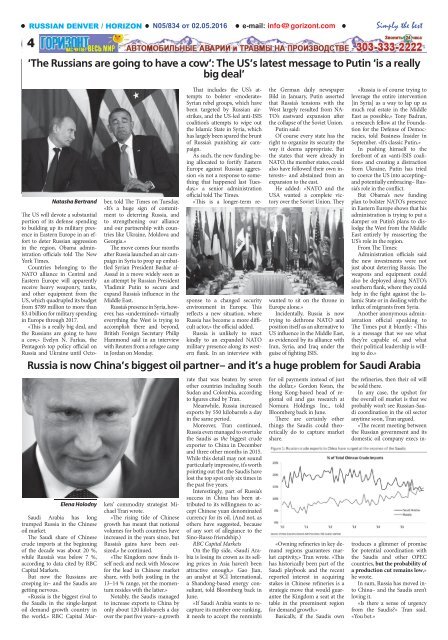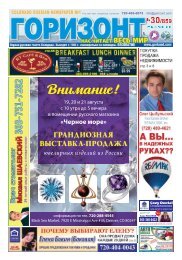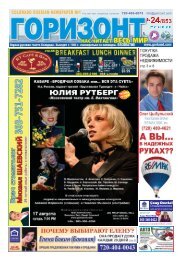Горизонт N5/834
Горизонт (газета) — (Gorizont англ. Horizon ) первая и наиболее влиятельная газета, издающаяся на русском языке в штатеКолорадо, США. Еженедельник, выходит по пятницам, формат Таблоид, 128 цветных и чернобелых страниц, распространяется в городах, составляющих метрополию Денвера (Большой Денвер), и в других населенных пунктах штата Колорадо от графства Саммит до графства Эль—Пасо. Полная электронная версия газеты «Горизонт» доступна в сети Интернет. Подробнее http://en.wikipedia.org/wiki/Gorizont_(newspaper)
Горизонт (газета) — (Gorizont англ. Horizon ) первая и наиболее влиятельная газета, издающаяся на русском языке в штатеКолорадо, США. Еженедельник, выходит по пятницам, формат Таблоид, 128 цветных и чернобелых страниц, распространяется в городах, составляющих метрополию Денвера (Большой Денвер), и в других населенных пунктах штата Колорадо от графства Саммит до графства Эль—Пасо. Полная электронная версия газеты «Горизонт» доступна в сети Интернет. Подробнее http://en.wikipedia.org/wiki/Gorizont_(newspaper)
Create successful ePaper yourself
Turn your PDF publications into a flip-book with our unique Google optimized e-Paper software.
RUSSIAN DENVER / HORIZON<br />
N05/<strong>834</strong> от 02.05.2016 e-mail: info@gorizont.com Simply the best<br />
4<br />
‘The Russians are going to have a cow’: The US’s latest message to Putin ‘is a really<br />
big deal’<br />
Natasha Bertrand<br />
The US will devote a substantial<br />
portion of its defense spending<br />
to building up its military presence<br />
in Eastern Europe in an effort<br />
to deter Russian aggression<br />
in the region, Obama administration<br />
officials told The New<br />
York Times.<br />
Countries belonging to the<br />
NATO alliance in Central and<br />
Eastern Europe will apparently<br />
receive heavy weaponry, tanks,<br />
and other equipment from the<br />
US, which quadrupled its budget<br />
from $789 million to more than<br />
$3.4 billion for military spending<br />
in Europe through 2017.<br />
«This is a really big deal, and<br />
the Russians are going to have<br />
a cow,» Evelyn N. Farkas, the<br />
Pentagon’s top policy official on<br />
Russia and Ukraine until October,<br />
told The Times on Tuesday.<br />
«It’s a huge sign of commitment<br />
to deterring Russia, and<br />
to strengthening our alliance<br />
and our partnership with countries<br />
like Ukraine, Moldova and<br />
Georgia.»<br />
The move comes four months<br />
after Russia launched an air campaign<br />
in Syria to prop up embattled<br />
Syrian President Bashar al-<br />
Assad in a move widely seen as<br />
an attempt by Russian President<br />
Vladimir Putin to secure and<br />
expand Russia’s influence in the<br />
Middle East.<br />
Russia’s presence in Syria, however,<br />
has «undermined» virtually<br />
everything the West is trying to<br />
accomplish there and beyond,<br />
British Foreign Secretary Philip<br />
Hammond said in an interview<br />
with Reuters from a refugee camp<br />
in Jordan on Monday.<br />
That includes the US’s attempts<br />
to bolster «moderate»<br />
Syrian rebel groups, which have<br />
been targeted by Russian airstrikes,<br />
and the US-led anti-ISIS<br />
coalition’s attempts to wipe out<br />
the Islamic State in Syria, which<br />
has largely been spared the brunt<br />
of Russia’s punishing air campaign.<br />
As such, the new funding being<br />
allocated to fortify Eastern<br />
Europe against Russian aggression<br />
«is not a response to something<br />
that happened last Tuesday,»<br />
a senior administration<br />
official told The Times.<br />
«This is a longer-term response<br />
to a changed security<br />
environment in Europe. This<br />
reflects a new situation, where<br />
Russia has become a more difficult<br />
actor,» the official added.<br />
Russia is unlikely to react<br />
kindly to an expanded NATO<br />
military presence along its western<br />
flank. In an interview with<br />
the German daily newspaper<br />
Bild in January, Putin asserted<br />
that Russia’s tensions with the<br />
West largely resulted from NA-<br />
TO’s eastward expansion after<br />
the collapse of the Soviet Union.<br />
Putin said:<br />
Of course every state has the<br />
right to organize its security the<br />
way it deems appropriate. But<br />
the states that were already in<br />
NATO, the member states, could<br />
also have followed their own interests–<br />
and abstained from an<br />
expansion to the east.<br />
He added: «NATO and the<br />
USA wanted a complete victory<br />
over the Soviet Union. They<br />
wanted to sit on the throne in<br />
Europe alone.»<br />
Incidentally, Russia is now<br />
trying to dethrone NATO and<br />
position itself as an alternative to<br />
US influence in the Middle East,<br />
as evidenced by its alliance with<br />
Iran, Syria, and Iraq under the<br />
guise of fighting ISIS.<br />
«Russia is of course trying to<br />
leverage the entire intervention<br />
[in Syria] as a way to lap up as<br />
much real estate in the Middle<br />
East as possible,» Tony Badran,<br />
a research fellow at the Foundation<br />
for the Defense of Democracies,<br />
told Business Insider in<br />
September. «It’s classic Putin.»<br />
In pushing himself to the<br />
forefront of an «anti-ISIS coalition»<br />
and creating a distraction<br />
from Ukraine, Putin has tried<br />
to coerce the US into accepting–<br />
and potentially embracing– Russia’s<br />
role in the conflict.<br />
But Obama’s new funding<br />
plan to bolster NATO’s presence<br />
in Eastern Europe shows that his<br />
administration is trying to put a<br />
damper on Putin’s plans to dislodge<br />
the West from the Middle<br />
East entirely by reasserting the<br />
US’s role in the region.<br />
From The Times:<br />
Administration officials said<br />
the new investments were not<br />
just about deterring Russia. The<br />
weapons and equipment could<br />
also be deployed along NATO’s<br />
southern flank, where they could<br />
help in the fight against the Islamic<br />
State or in dealing with the<br />
influx of migrants from Syria.<br />
Another anonymous administration<br />
official speaking to<br />
The Times put it bluntly: «This<br />
is a message that we see what<br />
they’re capable of, and what<br />
their political leadership is willing<br />
to do.»<br />
Russia is now China’s biggest oil partner– and it’s a huge problem for Saudi Arabia<br />
Elena Holodny<br />
Saudi Arabia has long<br />
trumped Russia in the Chinese<br />
oil market.<br />
The Saudi share of Chinese<br />
crude imports at the beginning<br />
of the decade was about 20 %,<br />
while Russia’s was below 7 %,<br />
according to data cited by RBC<br />
Capital Markets.<br />
But now the Russians are<br />
creeping in– and the Saudis are<br />
getting nervous.<br />
«Russia is the biggest rival to<br />
the Saudis in the single-largest<br />
oil demand growth country in<br />
the world,» RBC Capital Markets’<br />
commodity strategist Michael<br />
Tran wrote.<br />
«The rising tide of Chinese<br />
growth has meant that notional<br />
volumes for both countries have<br />
increased in the years since, but<br />
Russia’s gains have been outsized,»<br />
he continued.<br />
«The Kingdom now finds itself<br />
neck and neck with Moscow<br />
for the lead in Chinese market<br />
share, with both jostling in the<br />
13–14 % range, yet the momentum<br />
resides with the latter.»<br />
Notably, the Saudis managed<br />
to increase exports to China by<br />
only about 120 kilobarrels a day<br />
over the past five years– a growth<br />
rate that was beaten by seven<br />
other countries including South<br />
Sudan and Colombia, according<br />
to figures cited by Tran.<br />
Meanwhile, Russia increased<br />
exports by 550 kilobarrels a day<br />
in the same period.<br />
Moreover, Tran continued,<br />
Russia even managed to overtake<br />
the Saudis as the biggest crude<br />
exporter to China in December<br />
and three other months in 2015.<br />
While this detail may not sound<br />
particularly impressive, it’s worth<br />
pointing out that the Saudis have<br />
lost the top spot only six times in<br />
the past five years.<br />
Interestingly, part of Russia’s<br />
success in China has been attributed<br />
to its willingness to accept<br />
Chinese yuan denominated<br />
currency for its oil. (And not, as<br />
others have suggested, because<br />
of any sort of allegiance to the<br />
Sino-Russo friendship.)<br />
RBC Capital Markets<br />
On the flip side, «Saudi Arabia<br />
is losing its crown as its selling<br />
prices in Asia haven’t been<br />
attractive enough,» Gao Jian,<br />
an analyst at SCI International,<br />
a Shandong-based energy consultant,<br />
told Bloomberg back in<br />
June.<br />
«If Saudi Arabia wants to recapture<br />
its number one ranking,<br />
it needs to accept the renminbi<br />
for oil payments instead of just<br />
the dollar,» Gordon Kwan, the<br />
Hong Kong-based head of regional<br />
oil and gas research at<br />
Nomura Holdings Inc., told<br />
Bloomberg back in June.<br />
There are certainly other<br />
things the Saudis could theoretically<br />
do to capture market<br />
share.<br />
«Owning refineries in key demand<br />
regions guarantees market<br />
captivity,» Tran wrote. «This<br />
has historically been part of the<br />
Saudi playbook and the recent<br />
reported interest in acquiring<br />
stakes in Chinese refineries is a<br />
strategic move that would guarantee<br />
the Kingdom a seat at the<br />
table in the preeminent region<br />
for demand growth.»<br />
Basically, if the Saudis own<br />
the refineries, then their oil will<br />
be sold there.<br />
In any case, the upshot for<br />
the overall oil market is that we<br />
probably won’t see Russian-Saudi<br />
coordination in the oil sector<br />
anytime soon, Tran argued.<br />
«The recent meeting between<br />
the Russian government and its<br />
domestic oil company execs introduces<br />
a glimmer of promise<br />
for potential coordination with<br />
the Saudis and other OPEC<br />
countries, but the probability of<br />
a production cut remains low,»<br />
he wrote.<br />
In sum, Russia has moved into<br />
China– and the Saudis aren’t<br />
loving it.<br />
«Is there a sense of urgency<br />
from the Saudis?» Tran said.<br />
«You bet.»

















